19 start with C start with C

Informed and up to date, Challenged Sovereignty explains the effects of today’s globalized problems on the contemporary Caribbean.
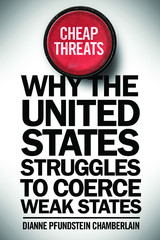
Why do weak states resist threats of force from the United States, especially when history shows that this superpower carries out its ultimatums? Cheap Threats upends conventional notions of power politics and challenges assumptions about the use of compellent military threats in international politics.
Drawing on an original dataset of US compellence from 1945 to 2007 and four in-depth case studies—the Cuban Missile Crisis, the 2011 confrontation with Libya, and the 1991 and 2003 showdowns with Iraq—Dianne Pfundstein Chamberlain finds that US compellent threats often fail because threatening and using force became comparatively “cheap” for the United States after the Cold War. Becoming the world’s only superpower and adopting a new light-footprint model of war, which relied heavily on airpower and now drones, have reduced the political, economic, and human costs that US policymakers face when they go to war. Paradoxically, this lower-cost model of war has cheapened US threats and fails to signal to opponents that the United States is resolved to bear the high costs of a protracted conflict. The result: small states gamble, often unwisely, that the United States will move on to a new target before achieving its goals.
Cheap Threats resets the bar for scholars and planners grappling with questions of state resolve, hegemonic stability, effective coercion, and other issues pertinent in this new era of US warfighting and diplomacy.
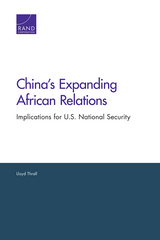

China is today regarded as a major player in world politics, with growing expectations for it to do more to address global challenges. Yet relatively little is known about how it sees itself as a great power and understands its obligations to the world.
In China’s Global Identity, Hoo Tiang Boon embarks on the first sustained study of China’s great power identity. Focus is drawn to China’s positioning of itself as a responsible power and the underestimated role played by the United States in shaping this face. In 1995 President Bill Clinton notably called for China to become a responsible great power, one that integrates itself into existing international institutions and becomes a leader in solving global problems. Chinese leaders were at that time already debating their future course and obligations to the world. Hoo examines this ongoing internal debate through Chinese sources and reveals the underestimated role that the United States has in this dialogue. Unraveling the big power politics, history, events, and ideas behind the emergence and evolution of China’s great power identity, the book provides fresh insights into the real-world issues of how China might use its power as it grows. The question of China’s role as a responsible power has real-world implications for its diplomacy and trajectory, as well as the responses of states adjusting to these shifts. The book offers a new lens for scholars, policy professionals, diplomats, and students in the fields of international relations and Asian affairs to make sense of China’s rise and its impact on America and global order.

A critical look at how China’s growing strategic arsenal could impact a rapidly changing world order
China’s strategic capabilities and doctrine have historically differed from the United States’ and Russia’s. China has continued to modernize and expand its arsenal despite its policy of no first use, while the United States and Russia have decreased deployed weapons stocks.
This volume brings together an international group of distinguished scholars to provide a fresh assessment of China's strategic military capabilities, doctrines, and political perceptions in light of rapidly advancing technologies, an expanding and modernizing nuclear arsenal, and an increased great-power competition with the United States.
Analyzing China's strategic arsenal is critical for a deeper understanding of China’s relations with both its neighbors and the world. Without a doubt, China’s arsenal is growing in size and sophistication, but key uncertainties also lie ahead. Will China’s new capabilities and confidence lead it to be more assertive and take more risks? Will China’s nuclear traditions change as the strategic balance improves? Will China’s approach to military competition be guided by a notion of strategic stability or not? Will there be a strategic arms race with the United States? China's Strategic Arsenal provides a current understanding of these issues as we strive for a stable strategic future with China.
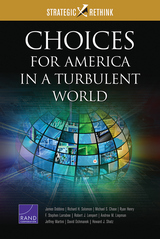
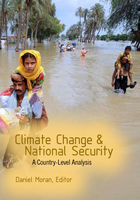
In this unique and innovative contribution to environmental security, an international team of scholars explore and estimate the intermediate-term security risks that climate change may pose for the United States, its allies and partners, and for regional and global order through the year 2030. In profiles of forty-two key countries and regions, each contributor considers the problems that climate change will pose for existing institutions and practices. By focusing on the conduct of individual states or groups of nations, the results add new precision to our understanding of the way environmental stress may be translated into political, social, economic, and military challenges in the future.
Countries and regions covered in the book include China, Vietnam, The Philippines, Indonesia, India, Pakistan, Bangladesh, Central Asia, the European Union, the Persian Gulf, Egypt, Turkey, the Maghreb, West Africa, Southern Africa, the Northern Andes, and Brazil.

In the heady days of the Cold War, when the Bomb loomed large in the ruminations of Washington’s wise men, policy intellectuals flocked to the home of Albert and Roberta Wohlstetter to discuss deterrence and doomsday. The Cold World They Made takes a fresh look at the original power couple of strategic studies. Seeking to unravel the complex tapestry of the Wohlstetters’ world and worldview, Ron Robin reveals fascinating insights into an unlikely husband-and-wife pair who, at the height of the most dangerous military standoff in history, gained access to the deepest corridors of American power.
The author of such classic Cold War treatises as “The Delicate Balance of Terror,” Albert Wohlstetter is remembered for advocating an aggressive brinksmanship that stood in stark contrast with what he saw as weak and indecisive policies of Soviet containment. Yet Albert’s ideas built crucially on insights gleaned from his wife. Robin makes a strong case for the Wohlstetters as a team of intellectual equals, showing how Roberta’s scholarship was foundational to what became known as the Wohlstetter Doctrine. Together at RAND Corporation, Albert and Roberta crafted a mesmerizing vision of the Soviet threat, theorizing ways for the United States to emerge victorious in a thermonuclear exchange.
Far from dwindling into irrelevance after the Cold War, the torch of the Wohlstetters’ intellectual legacy was kept alive by well-placed disciples in George W. Bush’s administration. Through their ideological heirs, the Wohlstetters’ signature combination of brilliance and hubris continues to shape American policies.
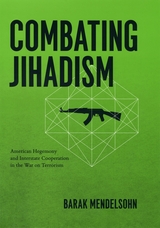

As the costs of a preemptive foreign policy in Iraq have become clear, strategies such as containment and deterrence have been gaining currency among policy makers. This comprehensive book offers an agenda for the contemporary practice of deterrence—especially as it applies to nuclear weapons—in an increasingly heterogeneous global and political setting.
Moving beyond the precepts of traditional deterrence theory, this groundbreaking volume offers insights for the use of deterrence in the modern world, where policy makers may encounter irrational actors, failed states, religious zeal, ambiguous power relationships, and other situations where the traditional rules of statecraft do not apply. A distinguished group of contributors here examines issues such as deterrence among the Great Powers; the problems of regional and nonstate actors; and actors armed with chemical, biological, and nuclear weapons. Complex Deterrence will be a valuable resource for anyone facing the considerable challenge of fostering security and peace in the twenty-first century.
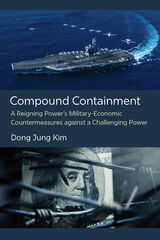
When does a reigning great power of the international system supplement military containment of a challenging power by restricting its economic exchanges with that state? Scholars of great power politics have traditionally focused on examining a reigning power’s military containment of a challenging power. In direct contrast, Compound Containment demonstrates that these conventional studies are flawed without a sound understanding of the multilayered aspects of containment strategy in great power politics. Since economic capacity and military power are intimately linked to one another, countering a challenging power requires addressing both economic and military dimensions. Nonetheless, this nexus of security and economy in a reigning power’s response to a challenging power cannot be explained by traditional theories that dominate research in international security. Author Dong Jung Kim fills a gap in the scholarship on great power competition by investigating when a reigning power will make its military containment of a challenging power “compound” by simultaneously employing restrictive economic measures. Its main theoretical claims are corroborated by an analysis of key historical cases of reigning power-challenging power competition. This book also offers policy prescriptions for the United States by examining whether the United States is in a position to complement military containment of China with restrictive economic measures.
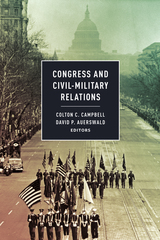
While the president is the commander in chief, the US Congress plays a critical and underappreciated role in civil-military relations—the relationship between the armed forces and the civilian leadership that commands it. This unique book edited by Colton C. Campbell and David P. Auerswald will help readers better understand the role of Congress in military affairs and national and international security policy. Contributors include the most experienced scholars in the field as well as practitioners and innovative new voices, all delving into the ways Congress attempts to direct the military.
This book explores four tools in particular that play a key role in congressional action: the selection of military officers, delegation of authority to the military, oversight of the military branches, and the establishment of incentives—both positive and negative—to encourage appropriate military behavior. The contributors explore the obstacles and pressures faced by legislators including the necessity of balancing national concerns and local interests, partisan and intraparty differences, budgetary constraints, the military's traditional resistance to change, and an ongoing lack of foreign policy consensus at the national level. Yet, despite the considerable barriers, Congress influences policy on everything from closing bases to drone warfare to acquisitions.
A groundbreaking study, Congress and Civil-Military Relations points the way forward in analyzing an overlooked yet fundamental government relationship.

A new history shows how FDR developed a vision of national security focused not just on protecting Americans against physical attack but also on ensuring their economic well-being—and how the nascent conservative movement won the battle to narrow its meaning, durably reshaping US politics.
Americans take for granted that national security comprises physical defense against attacks. But the concept of national security once meant something more. Franklin Roosevelt’s vision for national security, Peter Roady argues, promised an alternate path for the United States by devoting as much attention to economic want as to foreign threats. The Contest over National Security shows how a burgeoning conservative movement and power-hungry foreign policy establishment together defeated FDR’s plans for a comprehensive national security state and inaugurated the narrower approach to national security that has dominated ever since.
In the 1930s, Roosevelt and his advisors, hoping to save the United States from fascism and communism, argued that national security entailed protection from both physical attack and economic want. Roosevelt’s opponents responded by promoting a more limited national security state privileging military defense over domestic economic policy. Conservatives brought numerous concerns to bear through an enormous public relations offensive, asserting not just that Roosevelt’s plans threatened individual freedom but also that the government was less competent than the private sector and incapable of delivering economic security.
This contest to define the government’s national security responsibilities in law and in the public mind, Roady reveals, explains why the United States developed separate and imbalanced national security and welfare states, with far-reaching consequences. By recovering FDR’s forgotten vision, Roady restores a more expansive understanding of national security’s meanings as Americans today face the great challenges of their times.

Andrew Mumford challenges the notion of a “special relationship” between the United States and United Kingdom in diplomatic and military affairs, the most vaunted and, he says, exaggerated of associations in the post-1945 era. Though they are allies to be sure, national self-interest and domestic politics have often undercut their relationship.
This is the first book to combine a history of US-UK interaction during major counterinsurgency campaigns since 1945, from Palestine to Iraq and Afghanistan, with a critical examination of the so called special relationship that has been tested during these difficult, protracted, and costly conflicts. Mumford’s assessment of each nation’s internal political discussions and diplomatic exchanges reveals that in actuality there is only a thin layer of specialness at work in the wars that shaped the postcolonial balance of power, the fight against Communism in the Cold War, and the twenty-first-century “war on terror.” This book is especially timely given that the US-UK relationship is once again under scrutiny because of the Trump administration’s “America First” rhetoric and Britain's changing international relations as a result of Brexit. Counterinsurgency Wars and the Anglo-American Alliance will interest scholars and students of history, international relations, and security studies as well as policy practitioners in the field.
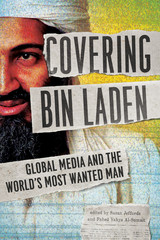
In Covering Bin Laden, editors Susan Jeffords and Fahed Yahya Al-Sumait collect perspectives from global scholars exploring a startling premise: that media depictions of Bin Laden not only diverge but often contradict each other, depending on the media provider and format, the place in which the depiction is presented, and the viewer's political and cultural background. The contributors analyze the representations of the many Bin Ladens, ranging from Al Jazeera broadcasts to video games. They examine the media's dominant role in shaping our understanding of terrorists and why/how they should be feared, and they engage with the ways the mosaic of Bin Laden images and narratives have influenced policies and actions around the world.
Contributors include Fahed Al-Sumait, Saranaz Barforoush, Aditi Bhatia, Purnima Bose, Ryan Croken, Simon Ferrari, Andrew Hill, Richard Jackson, Susan Jeffords, Joanna Margueritte-Giecewicz, Noha Mellor, Susan Moeller, Brigitte Nacos, Courtney C. Radsch, and Alexander Spencer.

An in-depth analysis of why COVID-19 warnings failed and how to avert the next disaster
Epidemiologists and national security agencies warned for years about the potential for a deadly pandemic, but in the end global surveillance and warning systems were not enough to avert the COVID-19 disaster. In The COVID-19 Intelligence Failure, Erik J. Dahl demonstrates that understanding how intelligence warnings work—and how they fail—shows why the years of predictions were not enough.
In the first in-depth analysis of the topic, Dahl examines the roles that both traditional intelligence services and medical intelligence and surveillance systems play in providing advance warning against public health threats—and how these systems must be improved for the future. For intelligence to effectively mitigate threats, specific, tactical-level warnings must be collected and shared in real time with receptive decision makers who will take appropriate action. Dahl shows how a combination of late and insufficient warnings about COVID-19, the Trump administration’s political aversion to scientific advice, and decentralized public health systems all exacerbated the pandemic in the United States. Dahl’s analysis draws parallels to other warning failures that preceded major catastrophes from Pearl Harbor to 9/11, placing current events in context.
The COVID-19 Intelligence Failure is a wake-up call for the United States and the international community to improve their national security, medical, and public health intelligence systems and capabilities.
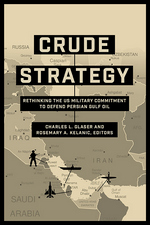
Should the United States ask its military to guarantee the flow of oil from the Persian Gulf? If the US security commitment is in fact strategically sound, what posture should the military adopt to protect Persian Gulf oil?
Charles L. Glaser and Rosemary A. Kelanic present a collection of new essays from a multidisciplinary team of political scientists, historians, and economists that provide answers to these questions. Contributors delve into a range of vital economic and security issues: the economic costs of a petroleum supply disruption, whether or not an American withdrawal increases the chances of oil-related turmoil, the internal stability of Saudi Arabia, budgetary costs of the forward deployment of US forces, and the possibility of blunting the effects of disruptions with investment in alternative energy resources. The result is a series of bold arguments toward a much-needed revision of US policy toward the Persian Gulf during an era of profound change in oil markets and the balance of power in the Middle East.

Cyber Blockades is the first book to examine the phenomena of blockade operations in cyberspace, large-scale attacks on infrastructure or systems that aim to prevent an entire state from sending or receiving electronic data. Cyber blockades can take place through digital, physical, and/or electromagnetic means. Blockade operations have historically been considered acts of war, thus their emergence in cyberspace has significant implications for international law and for our understanding of cyber warfare.
The author defines and explains the emerging concept of “cyber blockades” and presents a unique comparison of blockade operations in five different domains—on land, at sea, in the air, in space, and in cyberspace—identifying common elements as well as important distinctions. Alison Lawlor Russell’s framework for defining cyber blockades, understanding how they occur, and considering the motivations of actors who employ them is applied with in-depth analysis of the cyber attacks on Estonia in 2007 and on Georgia during the 2008 Georgia-Russia War.
Blockade operations have occurred in cyberspace and will doubtlessly be used again in the future, by both state and non-state actors alike, because of the unique advantages of this type of attack. This book offers recommendations for policymakers contemplating or confronted by such attacks. Cyber Blockades is also a must-read for scholars and students of security studies, terrorism, substate groups, and the future of warfare.
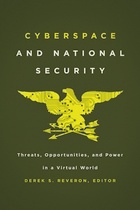
In a very short time, individuals and companies have harnessed cyberspace to create new industries, a vibrant social space, and a new economic sphere that are intertwined with our everyday lives. At the same time, individuals, subnational groups, and governments are using cyberspace to advance interests through malicious activity. Terrorists recruit, train, and target through the Internet, hackers steal data, and intelligence services conduct espionage. Still, the vast majority of cyberspace is civilian space used by individuals, businesses, and governments for legitimate purposes.
Cyberspace and National Security brings together scholars, policy analysts, and information technology executives to examine current and future threats to cyberspace. They discuss various approaches to advance and defend national interests, contrast the US approach with European, Russian, and Chinese approaches, and offer new ways and means to defend interests in cyberspace and develop offensive capabilities to compete there. Policymakers and strategists will find this book to be an invaluable resource in their efforts to ensure national security and answer concerns about future cyberwarfare.
READERS
Browse our collection.
PUBLISHERS
See BiblioVault's publisher services.
STUDENT SERVICES
Files for college accessibility offices.
UChicago Accessibility Resources
home | accessibility | search | about | contact us
BiblioVault ® 2001 - 2024
The University of Chicago Press









